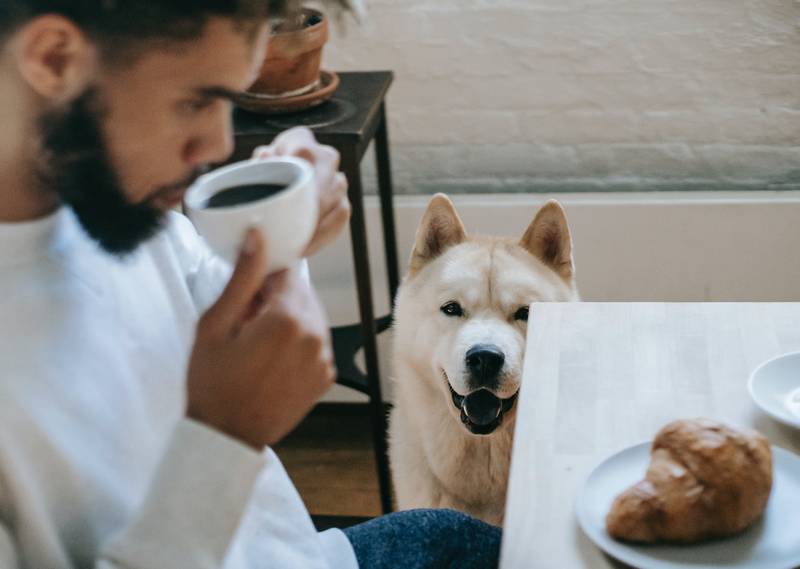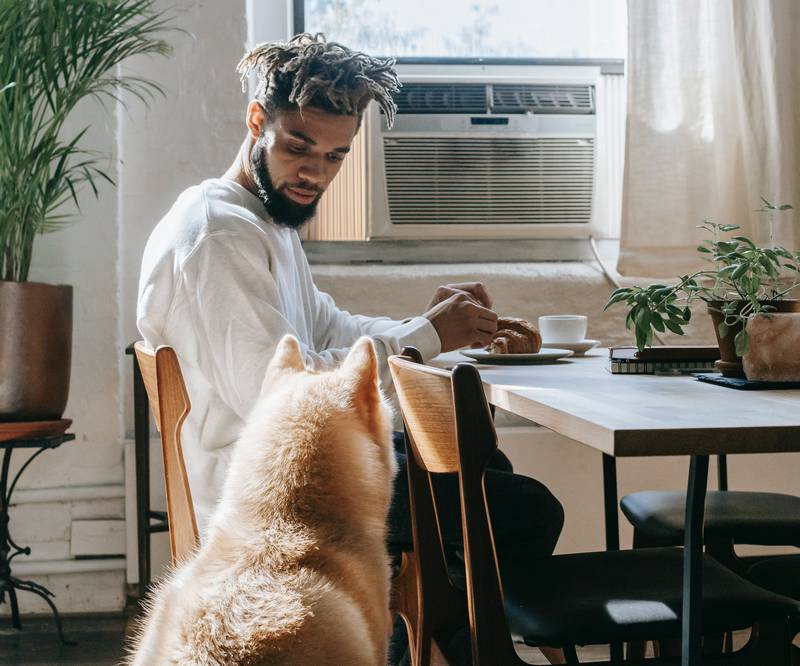My Dog Barks at Me When I Eat! How to Stop Demand Barking for Food
“My dog barks at me when I eat!” Frustrating, right? But don’t worry, because in this article we’ll teach you everything you need to know about how to stop demand barking for food. This includes going over why your dog barks when you eat, treating the root causes, and the easy command that will quickly quiet your dog.
We’ll also cover more you need to know about demand barking in dogs to ensure you’re ready to tackle this problem fully. We’ll explain what demand barking is, how to stop dog demand barking, the special considerations with puppy demand barking, and if it means they’re not getting enough food. Keep reading!
My Dog Barks at Me When I Eat

If your dog barks at you when you eat, it can be a frustrating and disruptive behavior. This type of demand barking is often a dog’s way of seeking attention or food. Understanding why your dog behaves this way and implementing consistent training strategies can help curb this behavior.
Dog Barks When I Eat, What Do I Do?
If your dog barks when you eat, it’s important to avoid reinforcing the behavior. Do not give them food or attention while they’re barking, as this can encourage the behavior. Instead, wait for a moment of silence before offering any interaction. Consistency in not rewarding the barking behavior is key to changing this habit.
Why Does My Dog Bark When I Eat?
Your dog barks when you eat typically because they want what you’re having or seek your attention. Dogs often learn that barking gets them what they want, whether it’s food, affection, or interaction. This behavior can also be driven by the dog’s instinctual desire for resources, especially if they perceive your food as highly desirable.
Train the “Quiet” Command
Training your dog with the “Quiet” command can help control demand barking:
- When your dog barks, calmly say “Quiet” and wait for them to stop barking.
- Once they stop barking, even for a brief moment, immediately reward them with a treat and praise.
- If they resume barking, repeat the command. Be patient and consistent.
- Practice this regularly in various situations to reinforce the training.
In summary, if your dog barks when you eat, addressing the behavior involves consistent training and not rewarding the barking. Training your dog with commands like “Quiet” and ensuring they don’t receive food or attention for barking will help reduce this behavior over time.
It’s important to remember, though, that the underlying behavioral issues (dominance, attention-seeking, etc.) that were causing all of this to begin with will still be present. And until you address those, any positive changes you see will only be temporary.
“Well, how do I make these changes last?”
By getting your dog to truly choose to follow your direction, that’s how. I tried many times to write out how you can do that before deciding it made more sense to just link you to the free video series that explains it better than I’d ever be able to.
The series is by a man named Dan who is one of the world’s leading dog obedience trainers. In it, he teaches you how to put an end to things like your dog barking when you eat and all other misbehavior using his fast and easy-to-follow methods.
In the first video, Dan will reveal to you why the two most common methods of dog training only doom you to failure. You can watch the video now by clicking here. Follow the proven system he’ll show you in his series and you’ll never have to spend another second worrying about your dog demand barking for food ever again!
How to Stop Demand Barking for Food

To stop demand barking for food, a common behavior problem in dogs, it’s important that you understand why dogs engage in this behavior and employ consistent training methods. This type of barking often occurs because dogs learn that barking can get them what they want – in this case, food.
What is Demand Barking?
Demand barking is a form of communication used by dogs to get attention or obtain something they want, like food or toys. It’s a learned behavior, where the dog realizes that barking leads to a desired outcome. This behavior can become a habit if consistently reinforced by the dog’s owners, whether knowingly or unknowingly.
Demand Barking in Dogs: How to Stop
To stop demand barking in dogs, you must avoid rewarding the behavior. This means not giving food or attention when your dog barks for it. Instead, wait until your dog is quiet and then reward that calm behavior. Establishing and enforcing rules consistently is key.
Teaching commands like “quiet” can also help. You can learn how to do it now by going back to the first section. Additionally, ensuring your dog has enough physical and mental stimulation can prevent barking due to boredom or excess energy.
It’s best that you get this issue handled right away, as doing so will also help your dog during other similar situations. You then won’t have to worry about things like your dog barking at the television, your dog barking at the door, or your dog barking for their ball.
Puppy Demand Barking
If your puppy is demand barking, it’s especially important to address this behavior early to prevent it from becoming a long-term habit. Puppies often bark for attention or food out of excitement or the desire to interact.
Consistent training, socialization, and setting boundaries are vital. Reward quiet behavior and ignore barking whenever possible to teach your puppy that silence, not barking, leads to rewards.
Demand Barking for Food: Are They Eating Enough?
When dealing with demand barking for food, consider whether your dog is getting enough to eat. Sometimes, dogs bark because they are genuinely hungry or their diet lacks certain nutrients.
Ensure that your dog is on a well-balanced diet and receiving the appropriate amount of food for their size, age, and activity level. However, if your dog is well-fed and continues to bark for food, it’s likely a behavioral issue rather than a dietary one.
In summary, to effectively stop demand barking for food, it’s important to understand the behavior’s root cause and to consistently discourage it by not rewarding the barking. Training commands like “quiet,” providing enough physical and mental exercise, and ensuring your dog is well-fed with a balanced diet are key components in managing this behavior.
I’m sure you’re ready to get started now that you have all of your questions about demand barking in dogs answered, so I’ll let you get started. Good luck, and thank you for reading our article “My Dog Barks at Me When I Eat! How to Stop Demand Barking for Food.”





